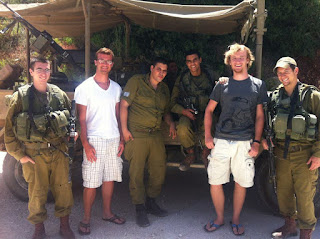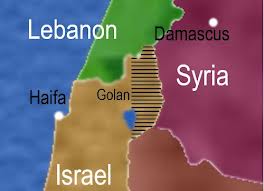I
stared out over a yellow grass plain stretching for miles in three different
directions. With the black top road to our backs myself and my German equal Julius
marveled. Mordechai, our guide and personal family friend of thirty years,
opened the tea-blotted road map. We followed his pruny finger slide across the
canvas as it alighted on three scarred regions.
 |
| Mordi and Julius |
“That
side is Lebanon. Over there is Syria, and here are we, in Israel.” This was
2012. Julius and I both finished a year of college. As a freshly turned
nineteen year old geopolitics escaped me. Instead, I casually daydreamed about
my next student film or ruminating over the breakup I still felt, nine months
later.
I
don’t recall the minor pleasantries we exchanged. I’m sure they amounted to
short platitudes like: “This is incredible.” Or “I’ve never seen something like
this.” Truthfully, even though we were at the nexus of a thousand-plus year old
conflict the view did not impress.
I
didn’t want to say the view was unimpressive. Small towns dotted the landscape
interrupting the Midwest-Kansas feel of another unending plain. As far as
meadows go they weren’t voluminous or expansive. They were there. Still, having
just come from the River Jordan and Jerusalem it’s tough to compare grassy seas
to the potential tomb of Jesus of Nazareth.
Mordi
brought out the bottle of red wine we purchased at the market in down town
Jerusalem. Fifty shekels bought us the small cabernet sauvignon, a loaf of
honey wheat bread, a pepperoni stick, some mozzarella cheese, olives dipped in
olive oil with sun-dried tomatoes, and the classic pita and hummus. If only we
had a straw basket. Then we could have a picnic
with a view.
 |
| It's common for soldiers to pose for photographs |
Quietly
avoiding attention I poured us all wine.
“They
are here to protect us.” Mordechai sawed slices of pepperoni for the bread.
“Protect
us?” I glanced back up at the convoy, almost spilling wine on myself.
“Of
course. This is dangerous spot. On that side is Hezbollah. On that side – pfft
– this is not safe. You see that town? There are terrorists.” I’ve never seen
anyone point ominously with a pepperoni stick until that day he pointed to the
small town immediately east of us.
“There
is Hezbollah. Snipers watch these cliffs looking for people to kidnap. Right
now there is someone watching us with a rifle. He sees us. He sees the
soldiers. He tells them ‘We cannot capture them. They have Israeli military.’
We are safe. Do not worry.” To conclude his argument Mordechai proudly laid
mozzarella on his sandwich, and took a bite.
Julius
and I both took two full gulps of wine to wash the news down.
“Did
you just say Hezbollah is watching us?” Julius sipped once more from the
plastic cup of wine.
Mordi’s
eyes rolled.
“Yes.
Just last week they kidnapped two of our soldiers. We pay the ransom, they give
us back the heads. Right here.” Smile lines turned to frown lines across
Mordi’s chin. Bushy salt-and-pepper eyebrows furrowed in frustration accumulated
over sixty years’ worth of modern history. Just like every Israeli we met on
that trip: he shrugged, but the frustration never really left his eyes. Such is
life.
“Who
wants to eat?”
Supposing
that I’m more likely to die of hunger than Hezbollah kidnapping me I reached
for a sandwich. I poured myself more wine. Out across the meadow a rifle barrel
might glint in the sun. Could I see the slight optical flare? Would I recognize
it for what is? Where does a sniper sit? Can these soldiers keep me safe? Am I
overreacting? Is Mordi messing with me? The military convoy conveyed the
gravity of the situation, but a pepperoni and mozzarella cheese sandwich under
the soft Israeli sun soothed my wide-eyed glare. The wine helped too.
The
five days we spent in Jerusalem prior to our Kerouac-meets-Call-of-Duty travel
taught me to trust the military guards. On the cobbled streets of the Old City
guards smiled for pictures while carrying MP4s. A guard stationed every twenty
feet prevented danger at Jaffa Gate. Hundreds of people crossed back and forth
through the high stone walls of the Lion Gate. Expecting violence, how could
the Israeli military not monitor the entry and exit points of their most
important neighborhood?
 |
| The Wailing Wall |
 |
| The Burial Stone of Jesus of Nazareth |
We
traveled south as well.
The desert that lifted and sank all the way to the horizon; white sands bleaching your corneas. The smell of roasted thyme chicken and tahini wafted past the three of us. A stop at Qum’ran enlightened me to the mysteries of the Dead Sea Scrolls. If I could reach out and touch those scrolls they would fall apart. The clay leftovers of a Jewish monastic order too strict for John the Baptist lay before me, with the cliff caves behind inviting new discoveries.
The desert that lifted and sank all the way to the horizon; white sands bleaching your corneas. The smell of roasted thyme chicken and tahini wafted past the three of us. A stop at Qum’ran enlightened me to the mysteries of the Dead Sea Scrolls. If I could reach out and touch those scrolls they would fall apart. The clay leftovers of a Jewish monastic order too strict for John the Baptist lay before me, with the cliff caves behind inviting new discoveries.
 |
| The Snake Path up to Masada |
Finally south to
the Dead Sea itself. The greatest geological marvel I’ve ever witnessed
tantalized me. I nearly salted the inside of my nostrils trying to swim laps.
Simply sit back and fall gently into the Sea. Let the Sea’s natural buoyancy carry
you wherever you choose. The healing effects of the mud and the water wiped
away our scars from hiking to the top of Masada. A sixteen-year-old girl used
her Grandmother to convince me we should trade phone numbers.
Israel
guards the mystery of every nook and cranny with armed guards. Mordechai’s
recount of the Six Days’ War included snipers on the streets of Jerusalem,
dropping wine barrels that imitated the sound of bombs falling, and every
Israeli pushing back against forces closing in on the potential borders of a
nation-state. He walked the streets of Jerusalem at seven years old, he told
us,, ducking and dodging potential sniper bullets. I couldn’t help but
sympathize.
The
sandwiches tasted delicious, despite the appetite-reducing threat of a bullet impacting my body. In fact, once I got past
the initial fear I recognized something odd: our protectors were our age. Mordi
told me once about compulsory military service for Israelis. The ramifications
sank in on that hilltop while I snacked on an olive.
I
approached, sandwich in hand, offering a bite.
 Despite
their polite decline to share food several soldiers got out, not to aim their
guns or point it at anything in particular, but to chat. It turns out one of
the soldiers lived in New Jersey before returning to Israel for his stint in
the army. Like most teenage boys we agreed on a few things: Israeli women are
beautiful, some of the best pizza is in New York, and the view was not
impressive. Mordi joined Julius and I at the sound of our laughter. Finally I
felt comfortable. Maybe there were men staring down riflescopes aimed at our
bodies, but these soldiers agreed that English is a difficult language to
learn.
Despite
their polite decline to share food several soldiers got out, not to aim their
guns or point it at anything in particular, but to chat. It turns out one of
the soldiers lived in New Jersey before returning to Israel for his stint in
the army. Like most teenage boys we agreed on a few things: Israeli women are
beautiful, some of the best pizza is in New York, and the view was not
impressive. Mordi joined Julius and I at the sound of our laughter. Finally I
felt comfortable. Maybe there were men staring down riflescopes aimed at our
bodies, but these soldiers agreed that English is a difficult language to
learn.
We
finished our lunch, Mordi smoked a hand rolled cigarette, and the convoy
followed us all the way to the Israeli-Syrian border. Julius fell asleep in the
back. Mordi rolled another cigarette, while driving, and smoked it. The plains
stretched on, a single road dividing Syria from Israel. I passively gazed out
on to the uninspired scenery. I sat up, prompting Mordi to notice.
On
the Syrian side of the road several tanks perched, barrels facing Israel. We
drove right past those tanks. I didn’t wake up Julius. A simple message: Do not
enter. I had no idea of the implications those tanks carried years after we
left Israel. Only in hindsight can I admit the eerie imagery carried ill omens,
not for our road trip but for the country of Syria.
Our
road trip passed more eventfully, although with less danger involved. We slept
on the banks of the Sea of Galilee. The soft sand soothed our misaligned backs
after two nights of sleeping on the ground. I woke up to a rosy sunset, and
swam from the shore to a buoy out in the distance, the waters quiet and calm
around me. By the time we got back to Mordi’s apartment in Jerusalem everyone
crashed. Only three days traveling the northern border of Israel, but more than
enough to exhaust each of us. Julius and I debated leaving the apartment to buy
dinner, but ultimately stayed in. We needed to process a lot. Mordi slept
fourteen hours.
Israel
exists in a state of extremes to me. Extreme beauty, both in the people and in
the land, and extreme danger. Israelis claim that because of it’s superb beauty
it’s highly coveted making it the most dangerous piece of paradise ever. I
would go on to argue with Mordechai about whether or not to nuke Syria, the
benefits of organized religion, and the merits of pita bread without hummus
(Mordi’s stance: you can’t eat pita bread alone. It’s sinful.) Combative,
delightful, and selective describe Mordi the best. As a representative of his
nation he’s a fine example of a people born into conflict for thousands of
years. Despite the incredible dissonances the people of Israel live, work, and
play like the rest of us. They, just like us, enjoy pepperoni and mozzarella
sandwiches on a nice hill top view even if they can’t accept them from American
tourists.



No comments:
Post a Comment